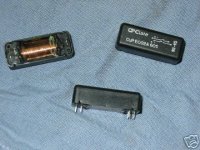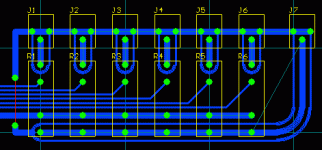hi all...i'm planning to build a volume control and...why not an imput selector?? i've found these vacuum relay,reed 5v activation, 175v 0.25A contact, but they are vacuum!like military ones!does anyone has experience with these?i expected a lower noise...what do you think?
i've found these vacuum relay,reed 5v activation, 175v 0.25A contact, but they are vacuum!like military ones!does anyone has experience with these?i expected a lower noise...what do you think?
Attachments
bremen nacht said:Would a sealed reed relay be better than an open gold-contact relay for low signal levels?
I know that dirt and oxidation can make ordinary relays sound nasty and presumably if the contacts are in a vacuum they're neither going to oxidise nor get dirty. Any other factors?
This is actually quite a complicated subject as, with no contact switching current available, there can be no contact cleaning action. So some relays are not necessarily specified for continuous low level use without DC. Reeds normally are OK.
Read relays also have a irreducable resistance of some 200mR due to the fact that the contact has to be magnetic or the relay will not close!
I have used miniature reeds in industrial applications switching sub microvolt levels but always in differential pairs because of thermal emf problems at low levels.
mV of audio should be no problem at all and they will last forever!
cliff said:I have used miniature reeds in industrial applications switching sub microvolt levels but always in differential pairs because of thermal emf problems at low levels.
Ah, that's how you do it! The hardest part was attempting to switch a good short, in the end I used some very flash military reed relays, and wired them up with fine wire, thermally insulated joints, ran them off RC circuits to limit ongoing drive current, and put them in a "low thermal" box with a little fan. I never thought of putting them back to back, in a differential pair, seems counterintuitive to creating a good short.
I've got some little relays with "Contact Material: Silver alloy with gold alloy overlay" which sounds like it will do the job for audio nicely, but the contacts are still rated for 10mV minimum. I have yet to measure the contact potential, and I might do some distortion tests on the contacts to see if there is anything to be picked up. I've never really known what is best from an audio POV for relays.
If anybody has pointers to threads or pages with more info into audio use of relays I'd be keen to find out.
Actually found some, by searching for "relay selector".
I've use the Takamisawa ones ones in threadid=83527 (don't know how to link to other threads) without probelms before.
I also designed a selector board about 10 years ago, but never got it made, after bad experiences elsewhere with the relays I was going to use on it (in fact that thermal problem above). Wouldn't mind restarting it, and make some vague attempt at selling them this time.
I've use the Takamisawa ones ones in threadid=83527 (don't know how to link to other threads) without probelms before.
I also designed a selector board about 10 years ago, but never got it made, after bad experiences elsewhere with the relays I was going to use on it (in fact that thermal problem above). Wouldn't mind restarting it, and make some vague attempt at selling them this time.
BTW the relays I found with very low thermal EMF were COTO reed relays in little red metal cases. I think they were DPST, very nice. Apparently my client got a knock on the door from the US military because he'd bought a whole lot surplus and they were restricted for export. I think he laughed at them, which didn't help matters.
I see COTO made low thermal EMF relays so perhaps this is what they were.
And this is as far I got on my relay input selector in 1995, using much cheaper reeds. I'm assuming those connectors are RCAs:
I see COTO made low thermal EMF relays so perhaps this is what they were.
And this is as far I got on my relay input selector in 1995, using much cheaper reeds. I'm assuming those connectors are RCAs:
Attachments
- Status
- This old topic is closed. If you want to reopen this topic, contact a moderator using the "Report Post" button.
- Home
- Amplifiers
- Chip Amps
- vacuum relay

